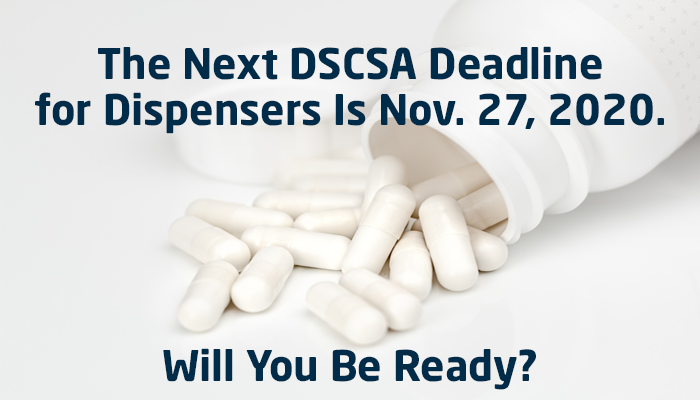Between 2015 and 2019, manufacturers, repackagers, wholesale distributors, and dispensers (i.e., pharmacies in hospitals, clinics, supermarkets, or elsewhere) have had to meet different compliance requirements of the Drug Supply Chain Security Act (DSCSA). Now, in 2020, another deadline is looming for dispensers: On November 27, they must be able to authenticate and verify the drugs they sell to consumers.
The DSCSA was enacted on November 27, 2013, as a means to secure the U.S. supply of medications. Phased rollout of regulations began in January 2015 and is scheduled to conclude on November 27, 2023. In a nutshell, the law mandates product serialization and traceability to stop harmful drugs from entering the supply chain, spot them if they do get in, and facilitate rapid response if any are detected.
Let’s take a quick look at how the DSCSA has affected dispensers to date — and what’s coming up in November.
Are you a dispenser?
As we noted above, dispensers are pharmacies. However, to make sure we’re all on the same page (and that you know if the law applies to you), here’s how the DSCSA defines “dispenser”:
- A retail pharmacy, hospital pharmacy, a group of chain pharmacies under common ownership and control that do not act as a wholesale distributor, or any other person authorized by law to dispense or administer prescription drugs, and the affiliated warehouses or distribution centers of such entities under common ownership and control that do not act as a wholesale distributor.
- Does not include a person who dispenses only products to be used in animals.
The first DSCSA deadline for dispensers
The first important deadline for dispensers was July 1, 2015, when they had to begin exchanging “T3” information about every drug they bought and who handled it each time it changed ownership in the United States. (Manufacturers, repackagers, and wholesale distributors had to do this starting January 1, 2015). For every transaction, they’re required to exchange “product tracing information” that includes three things:
1. Transaction Information (TI) about a product:
- Proprietary or established name or names
- Strength and dosage form
- National Drug Code number
- Container size
- Number of containers
- Lot number (certain wholesale distributor transactions were excluded from this requirement)
- Transaction date
- Shipment date (if more than 24 hours after the transaction date)
- Transfer of ownership (the name and addresses of the business/person from whom and to whom ownership is being transferred)
2. Transaction History (TH): An electronic statement with the TI for every transaction going back to the manufacturer. TH is is required until the November 27, 2023, deadline.
3. Transaction Statement (TS): An electronic statement confirming the entity transferring ownership:
- Is authorized as required under DSCSA
- Received the product from a person that is authorized as required under DSCSA
- Received TI and a TS from the prior owner of the product, as required under the law
- Did not knowingly ship a suspect or illegitimate product
- Had systems and processes in place to comply with verification requirements under the law
- Did not knowingly provide false TI or alter the transaction history.
2016-2019 milestones
There were three key requirements for dispensers between 2016 and 2019:
1. They must confirm their trading partners are licensed or registered.
- The FDA has searchable databases to check the registration of manufacturers and repackagers and the licensing of wholesale distributors and third-party logistics providers.
- If a dispenser is doing business with another dispenser, it must check licensing through the appropriate state authority. (See the site for more about dispensers.
2. They must receive, store, and provide product tracing documentation.
- Accept only prescription drugs with proper T3 information.
- Store the T3 information for six years.
- Generate and provide all T3 information when they sell a prescription drug to a trading partner.
3. They must investigate and properly handle suspect and illegitimate drugs
- This includes drugs that may be counterfeit, diverted, stolen, intentionally adulterated, or unfit for distribution.
- Quarantine and investigate suspect drugs to determine if they are fake. If they are determined to be fake, dispensers should work with the manufacturer and take specific action to ensure they do not reach patients/consumers. Pharmacies must also notify the FDA and relevant trading partners (i.e., those they bought the drug from and those they sold it to) about the compromised drug.
Preparing for November 2020
The next phase of DSCSA implementation for dispensers concerns authenticating and verifying drugs. They will have to have processes in place to authenticate and verify all the medicines they buy before selling them to consumers. (Wholesale distributors have been required to do this since November 2019.) This boils down to two key requirements:
1. Dispensers may buy and sell only products encoded with product identifiers (PIs).
- A PI is a standardized graphic with three elements: the product’s standardized numerical identifier (SNI), which comprises the National Drug Code plus a unique alphanumeric serial number); a lot number; and an expiration date. PIs must be in human- and machine-readable formats.
2. Verify every product at the package level, including the SNI.
- The FDA defines a package as “the smallest unit placed into interstate commerce by the manufacturer or the repackager that is intended by that manufacturer or repackager, as applicable, for individual sale to the pharmacy or other dispenser of the drug product.”
Final thoughts
We know: It can be confusing. That’s why you have to work with a supply chain solution provider that knows the DSCSA inside and out and can help you navigate the deadlines and unexpected changes or delays.
rfxcel has the DSCSA in its DNA. The solutions in our signature platform have DSCSA compliance built in. Our supply chain experts will, ahem, dispense their knowledge when you need it. They will advise, guide, and support you as you grow your business while safeguarding your customers. Contact us today to learn more about how we can help you with the DSCSA and your other supply chain needs.





